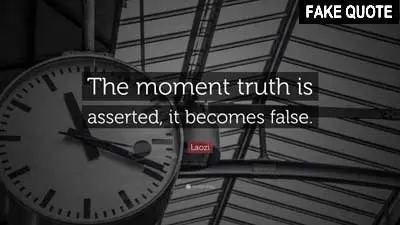|
Tao Te Ching
THE TAOISM OF LAO TZU
|
Fake Lao Tzu Quote"The moment truth..."
This is NOT a quote from Tao Te Ching:"The moment truth is asserted it becomes false."
This is a very strange statement, indeed. How can a truth become false when it is asserted? It makes no sense. It was either true or untrue already before being asserted. The claim itself does not make it false. Of course, a claim alone is no proof. Evidence is needed, but when the evidence is there, that's it — until other evidence invalidates it. There are many reflections through the history of human thought about the difficulty of finding the truth, and what is true to some is blatant lie to others. That is the message of Pontius Pilates' response when Jesus said he came into the world to bear witness to the truth: "What is truth?" (John 18:38).
As far as I have found, this quote seems to originate with the Indian guru Bhagwan Shree Rajneesh (1931-1990), later called Osho, who was famous and had many followers in the 1970s and 80s. He mentioned it in a speech on August 19, 1980, accrediting it to Lao Tzu. That and other speeches were recorded by his disciples and later published in several books, none of them giving the year of publication. The exact date of this speech is given in Theologia Mystica by Narinder Sharma (page 139). In another speech five days earlier, also documented in this book (page 61), Osho had another Lao Tzu quote, which most likely refers to the same saying, though with different wording:
Tao Te Ching does not contain such a statement, but Osho was a learned man and probably interpreted some line in the text as he perceived it. My guess is that he based it on the last line of chapter 78, which reads (my version):
He did warn against false claims of knowing the truth, in several chapters of Tao Te Ching. In particular, he distrusted those who took pride in being learned, full of knowledge instead of wisdom, like in the 81st and very last chapter of the book (my version):
In the speech where Osho used the quote examined here, he followed up by explaining: "There is no way to communicate truth. But language has to be used; there is no other way. So we always have to use the language with the condition that it cannot be adequate to the experience." It is close to the nihilistic approach of the Greek philosopher Gorgias, from the 5th century BC, who claimed that nothing exists, and if anything did exist, it could not be known to do so, and finally, if it could be known to exist, this knowledge could not be communicated. This reasoning is similar to the opening line of Tao Te Ching:
So, a plausible expression of Lao Tzu's standpoint regarding the fundamental truth of nature would be something like: A truth that can be stated is not the real truth. That's not so far from the meaning of Osho's quote.
Stefan Stenudd September 20, 2020.
More Fake Lao Tzu QuotesThere are many more fake Lao Tzu quotes examined on this website. Click the header to see a list of them.
Fake interview with the authorClick the header to read a "fake" interview with Stefan Stenudd, the author of Fake Lao Tzu Quotes.
About CookiesMy Other Websites:I Ching OnlineThe 64 hexagrams of the Chinese classic I Ching and what they mean in divination. Try it online for free.
Qi Energy ExercisesThe ancient Chinese life energy qi (chi) explained, with simple instructions on how to exercise it.
Life EnergyThe many ancient and modern life force beliefs all over the world explained and compared.
Taoismen på svenska
Other Books by Stefan StenuddClick the image to see the book at Amazon (paid link).
The Greek philosophers and what they thought about cosmology, myth, and the gods. |
 Tao Te Ching
Tao Te Ching Now it's a book, too!
Now it's a book, too! Tao Quotes
Tao Quotes Cosmos of the Ancients
Cosmos of the Ancients Qi — Increase Your Life Energy
Qi — Increase Your Life Energy Aikido Principles
Aikido Principles Life Energy Encyclopedia
Life Energy Encyclopedia Archetypes of Mythology
Archetypes of Mythology Psychoanalysis of Mythology
Psychoanalysis of Mythology Stefan Stenudd
Stefan Stenudd